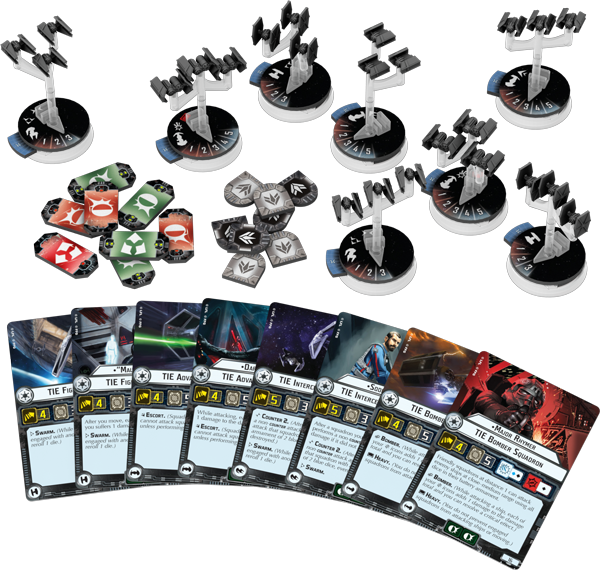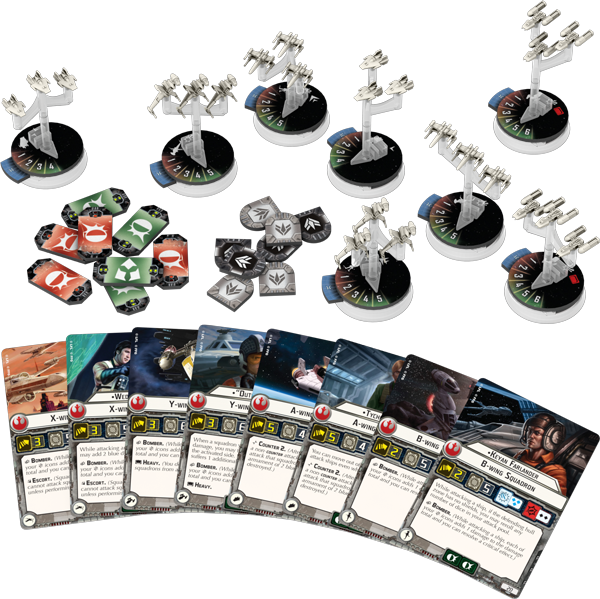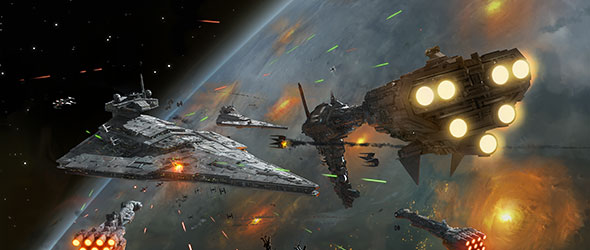
Lead the Fighter Attack

Lead the Fighter Attack
Preview the Rebel and Imperial Fighter Squadron Expansion Packs
“Admiral, we’re in position. All fighters accounted for.”
–Lando Calrissian
In our last two previews of Star Wars™: Armada, we looked at the game’s first capital ships, for both the Imperial Navy and the Rebel Alliance. We looked at how each ship’s different configurations offer it a range of tactical flexibility, as do the many titles and upgrades available in the Core Set and the first wave of expansions.
However, your capital ships are only part of the equation. Your starfighter squadrons can also make a major impact, but you have to use them properly. A good fleet admiral won’t deploy a screen of TIE fighters to perform a job better assigned to TIE bombers, nor use TIE bombers to intercept enemy fighters when TIE interceptors would better perform that task.
In today’s preview, then, we’ll take a look at the eight different fighter squadrons available in the Core Set and first wave of expansions, and we’ll explore some of the ways you may be able to make good use of their different abilities.
Imperial Fighter Squadrons
Imperial commanders are taught to take advantage of their superior numbers and firepower to overwhelm their foes, and this strategy relies in large measure upon the Empire’s seemingly limitless supply of TIE fighters.
In Armada, your standard TIE Fighter Squadron costs just eight of your 300 fleet points. For that investment, you gain a battery armament of one blue attack die and, more importantly, an anti-squadron armament of three blue attack dice. As one might expect, this makes it an extremely efficient anti-fighter unit, especially when you take into consideration its Swarm ability, which allows it to reroll one of its attack dice whenever it attacks a squadron engaged with another squadron.
Typically, that “another squadron” would be another TIE Fighter Squadron, but if you have a few fleet points to spare, it could just as well be “Howlrunner” or “Mauler” Mithel. These TIE fighter aces both cost roughly twice as much as a standard squadron, but in fleets that want to make short work of enemy fighters, they’re still a bargain. Both add considerable damage potential, and they also gain tremendous resilience from defense tokens that allow them to halve the damage from one attack and completely ignore the damage from another.
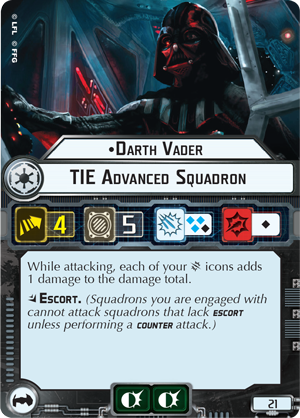
You can also add resilience to your fighter squadrons by upgrading to the TIE Advanced Squadron. The TIE Advanced Squadron features five hull and can shield your other fighter squadrons with its Escort ability. Squadrons with Escort prevent squadrons they are engaged with from performing attacks against squadrons without Escort.
Of course, the TIE Advanced is also the starfighter flown by the legendary Sith Lord Darth Vader. Drawing upon the dark side of the Force, Darth Vader adds an extra black die to all of his attacks against enemy fighter squadrons, and whenever he scores a  result, he adds one extra damage to his damage total.
result, he adds one extra damage to his damage total.
Meanwhile, if you’re looking to race your fighters across the battlefield as quickly as possible, you may wish to consider investing in one or more TIE Interceptor Squadrons. With a speed of “5,” this starfighter squadron is as fast as they come, and for just eleven fleet points, its pilots can Swarm their foes, roll four blue attack dice, and gain Counter 2.
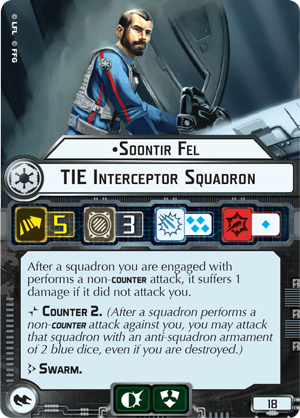
The Counter X keyword allows a squadron to attack any squadron that performs a non-counter attack against it, using an anti-squadron armament of X blue dice. Accordingly, your foe might wish to pick apart your other squadrons first, but Soontir Fel’s unique ability punishes anyone who pursues this strategy. Then, because Soontir Fel and your other TIE Interceptor Squadrons all have the Swarm keyword, they can have their Counter attacks further boosted by “Howlrunner.”
While most Imperial fighter squadrons excel at engaging other fighter squadrons, TIE Bomber Squadrons do not. They have the Heavy ability, which means they do not prevent engaged squadrons from attacking ships or moving. Instead, TIE Bomber Squadrons gain the Bomber ability.
Normally, when fighter squadrons attack a capital ship, they ignore all results other than  . However, ships with the Bomber ability add their
. However, ships with the Bomber ability add their  results to the damage total and can even resolve critical effects. This means that, at just nine fleet points, the TIE Bomber Squadron can be an impactful addition to any fleet, as its battery armament consists of one black die which, with a little luck, can deal two damage in a single attack.
results to the damage total and can even resolve critical effects. This means that, at just nine fleet points, the TIE Bomber Squadron can be an impactful addition to any fleet, as its battery armament consists of one black die which, with a little luck, can deal two damage in a single attack.
Rebel Fighter Squadrons
The Rebellion’s fighter squadrons feature the same keywords and abilities as the Empire’s, but they feature them in different combinations and with different, speeds, hull values, anti-squadron armaments, and battery armaments. Altogether, they feel like drastically different starfighters.
For example, the X-wing Squadron features the Escort keyword and a hull value of “5,” just like the TIE Advanced Squadron. However, it’s speed is one lower, at “3,” and it gains the Bomber ability, along with a potent battery armament of one red die. Altogether, it’s a more rounded fighter squadron than either the anti-fighter TIE Advanced Squadron or the TIE Bomber Squadron, but at thirteen fleet points, it’s also a larger investment than either of those Imperial squadrons.
Of course, the X-wing is also the starfighter of choice for many of the Rebellion’s greatest aces, and Luke Skywalker and Wedge Antilles are about as great as they come. With his battery armament of one black die and his ability to ignore enemy shields, Luke Skywalker excels at attacking enemy ships, potentially crippling them with devastating critical effects. On the other hand, Wedge Antilles is an unparalleled dogfighter, who can fire as many as six blue dice at an enemy squadron that has already been activated.
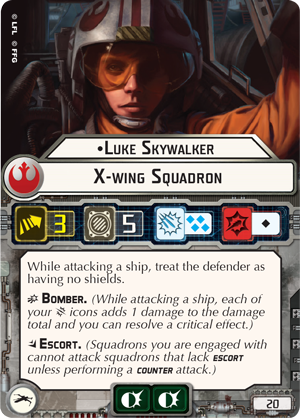
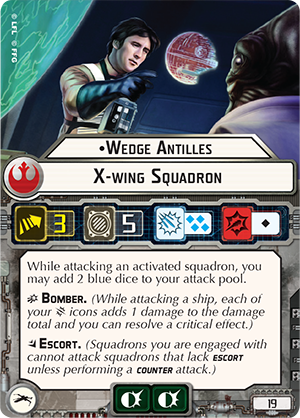
Here, we begin to see some of the heroics that one might expect from the Rebellion’s veterans. While you could simply have Wedge Antilles wait to activate until after his chosen target, you could choose, instead, to have him fly his squadron in formation with “Dutch” Vander, who can toggle the activation slider of any squadron he damages.
Both “Dutch” Vander and the standard Y-wing Squadron feature the Bomber and Heavy keywords like the Empire’s TIE Bomber Squadron. However, for one extra fleet point, the Y-wing Squadron features an anti-squadron armament of two blue dice, instead of one black die. It also differentiates itself from the TIE Bomber Squadron through the addition of one hull point and the loss of one point of speed. More importantly, though, the two starfighter squadrons don’t really share equivalent roles.
While the TIE Bomber Squadron is the Empire’s most effective and dedicated anti-ship squadron, the Rebellion’s most effective anti-ship squadron is the B-wing Squadron. Though it’s the slowest starfighter squadron in the game’s first wave, the B-wing Squadron is the one most likely to concern enemy ship captains. It features both the Bomber ability and a battery armament of two dice, one blue and one black. Once you get it into position, the B-wing Squadron’s attack dice race to the top of the charts for damage potential versus fleet points.
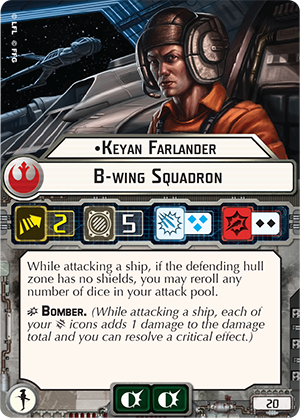
B-wing ace Keyan Farlander further enhances the B-wing’s lethality with his battery armament of two black dice and his unique ability, “While attacking a ship, if the defending hull zone has no shields, you may reroll any number of dice in your attack pool.”
Finally, while most of the Rebellion’s fighter squadrons are slower than the Empire’s, the A-wing Squadron offers Rebel players a means of racing quickly into engagements. With its speed of “5,” your A-wing Squadron can move swiftly into position to aid your other squadrons, or it can engage your foes early, holding them back from the other squadrons with which you intend to attack enemy ships. Either way, as soon as it’s locked into a high-speed dogfight, the A-wing Squadron’s Counter 2 ability gives it a decided edge.
Lock S-Foils in Attack Position
In Armada, you not only command your fleet, you assemble it. Thus, your path to victory begins with the careful selection of those ships and starfighter squadrons that you intend to take to battle. Will you use squadrons with the Bomber ability to batter enemy ships? Will you utilize interceptors to engage enemy fighters before they can approach your ships? Will you rely upon the talents of a few starfighter aces? The tactical flexibility that squadrons offer is limited only by the fact that you can’t spend more than one-third of your fleet points on fighter squadrons.
There’s no denying the raw power of the Star Wars galaxy’s capital ships, nor that they’re the heart of Armada and its battles. Still, there’s always room for personal heroics, and there’s always the chance that a single starfighter pilot can turn the tide of battle.
Star Wars: Armada is an epic two-player game of tactical fleet battles in the Star Wars universe. Massive Star Destroyers fly to battle against Rebel corvettes and frigates. Banks of turbolasers unleash torrential volleys of fire against squadrons of X-wing and TIEs. As Rebel and Imperial fleets collide, it is your job to issue the commands that will decide the course of battle and, ultimately, the fate of the galaxy.
© & TM Lucasfilm Ltd.

